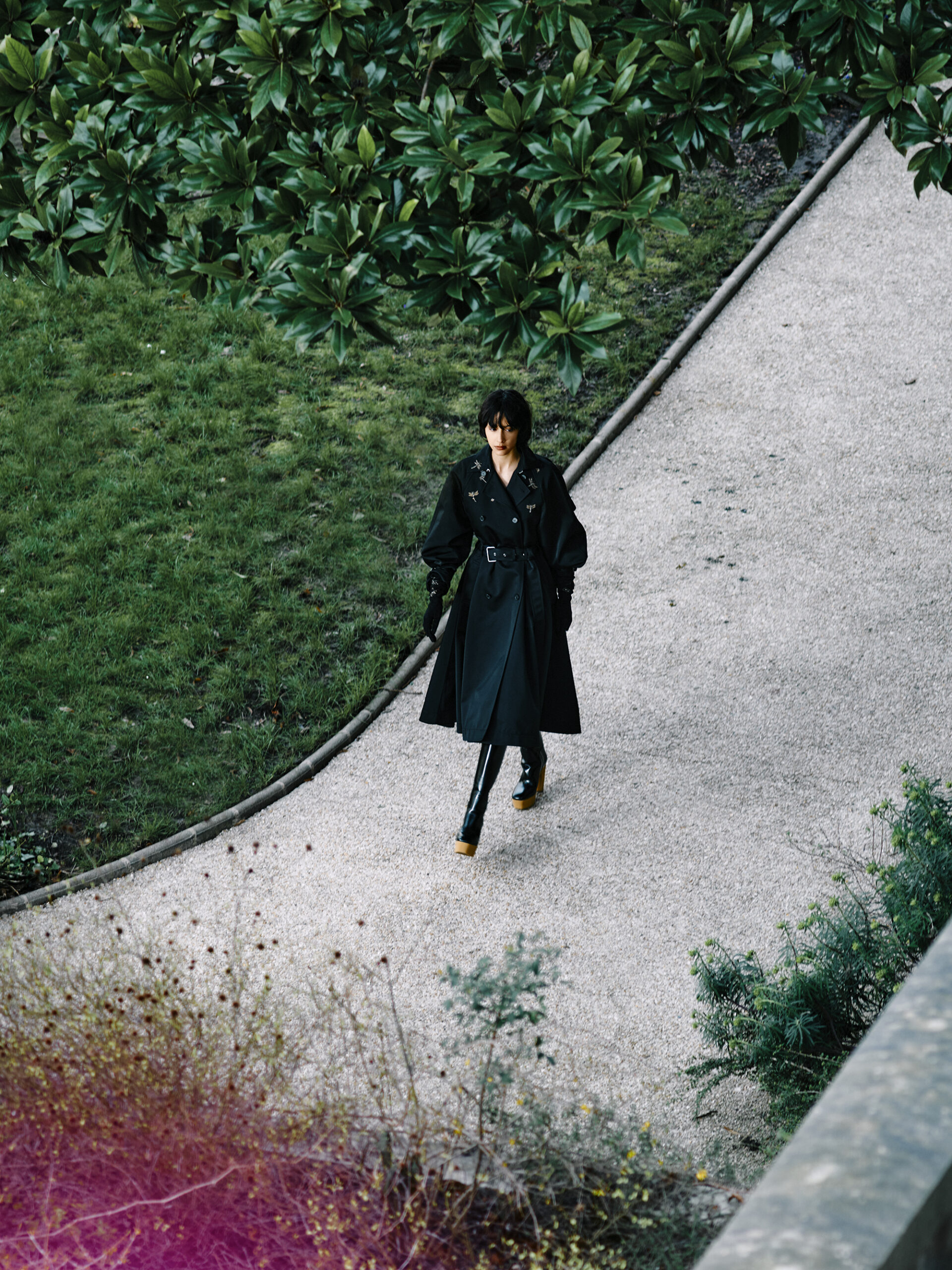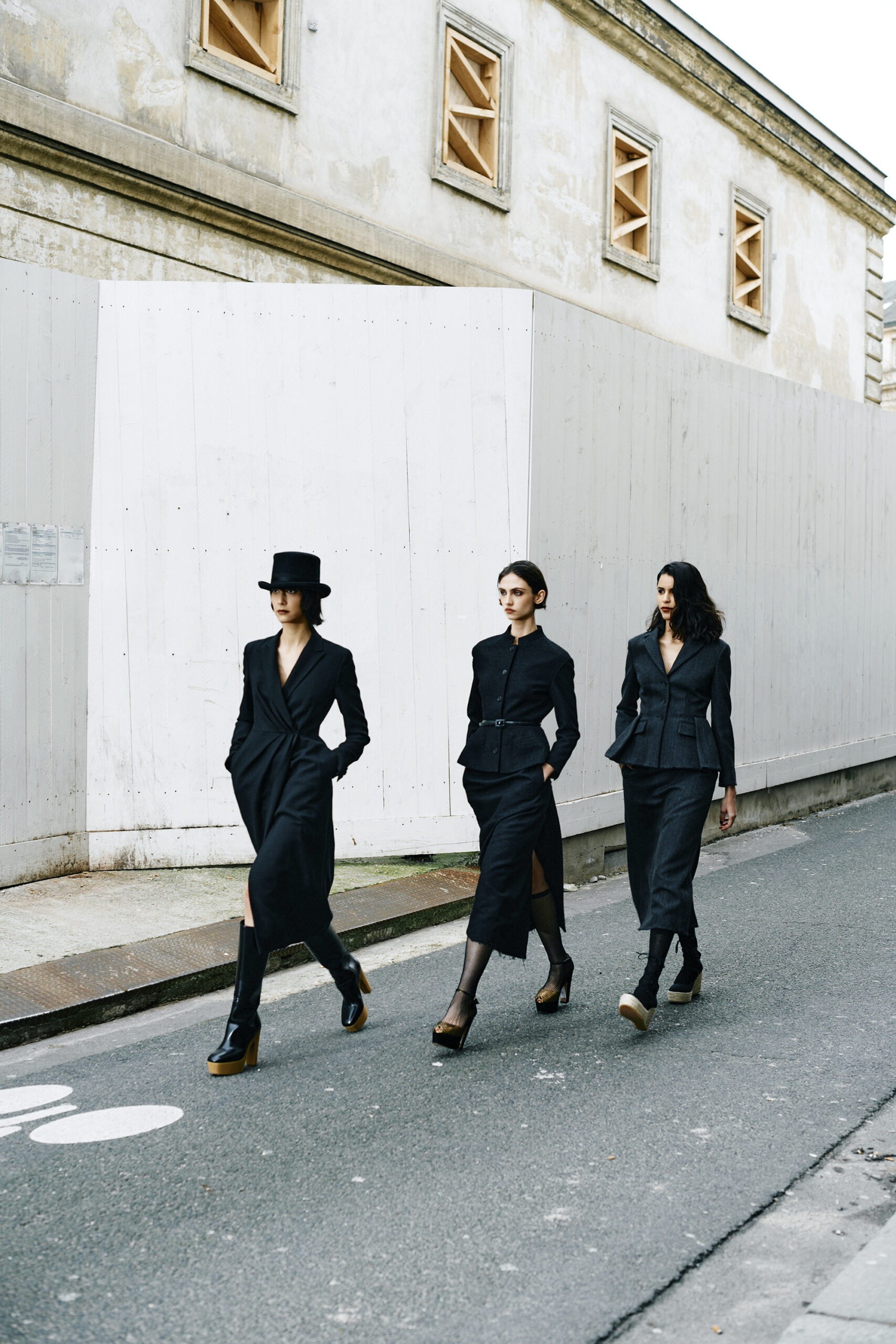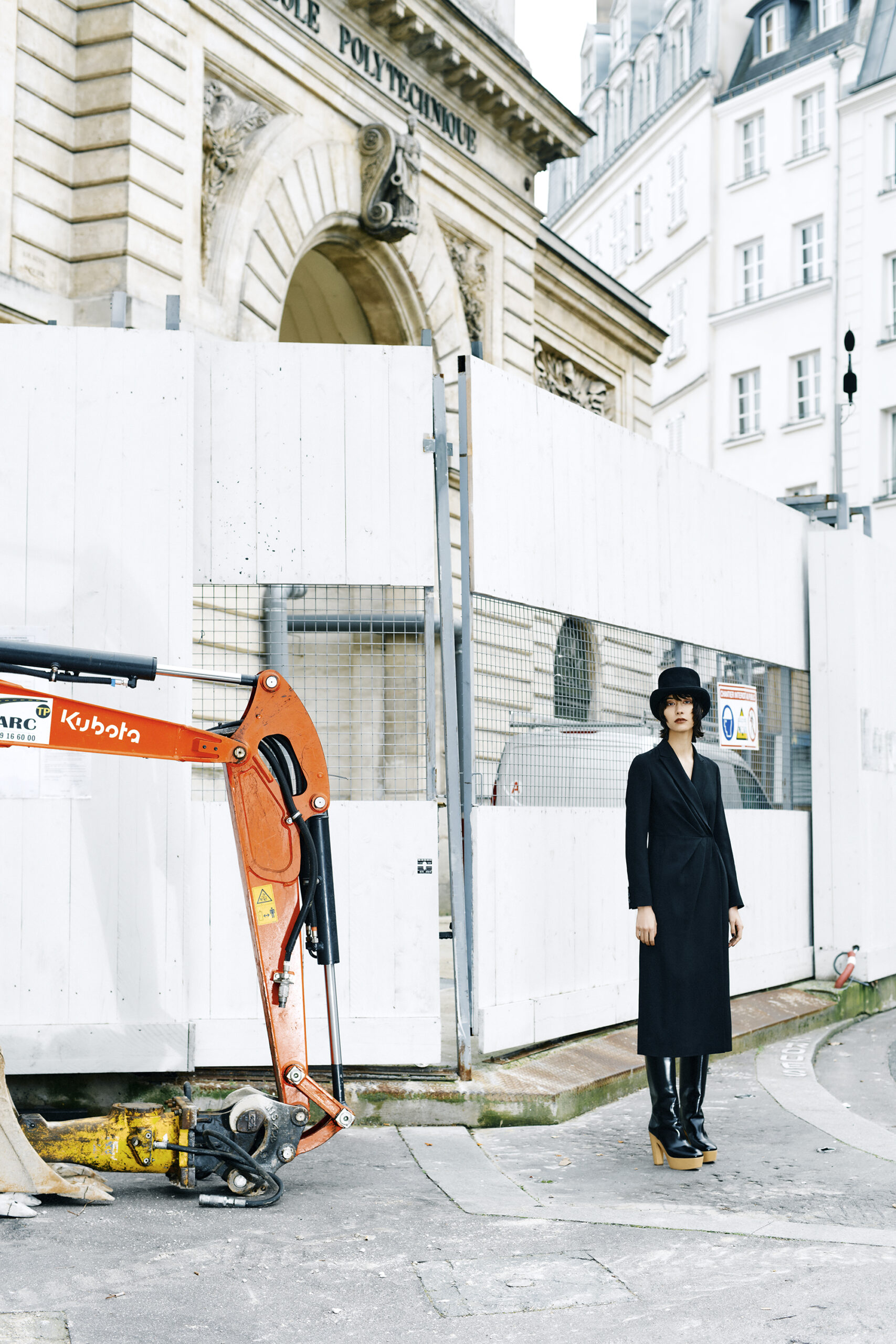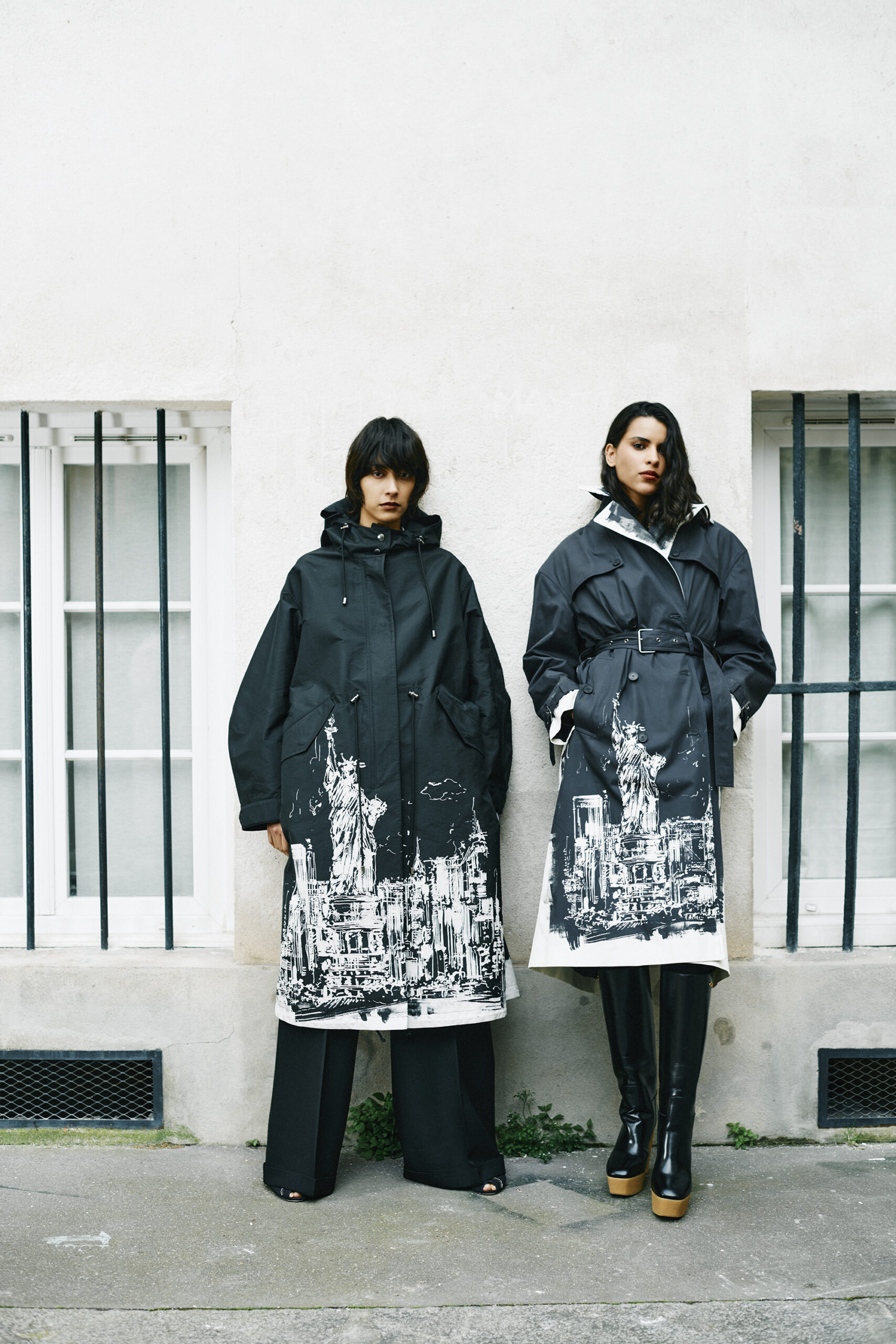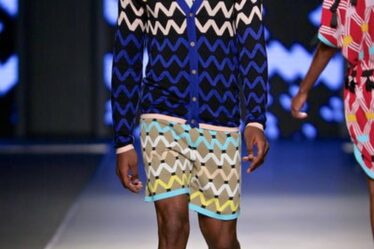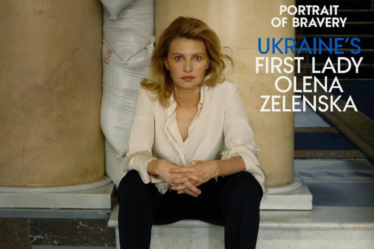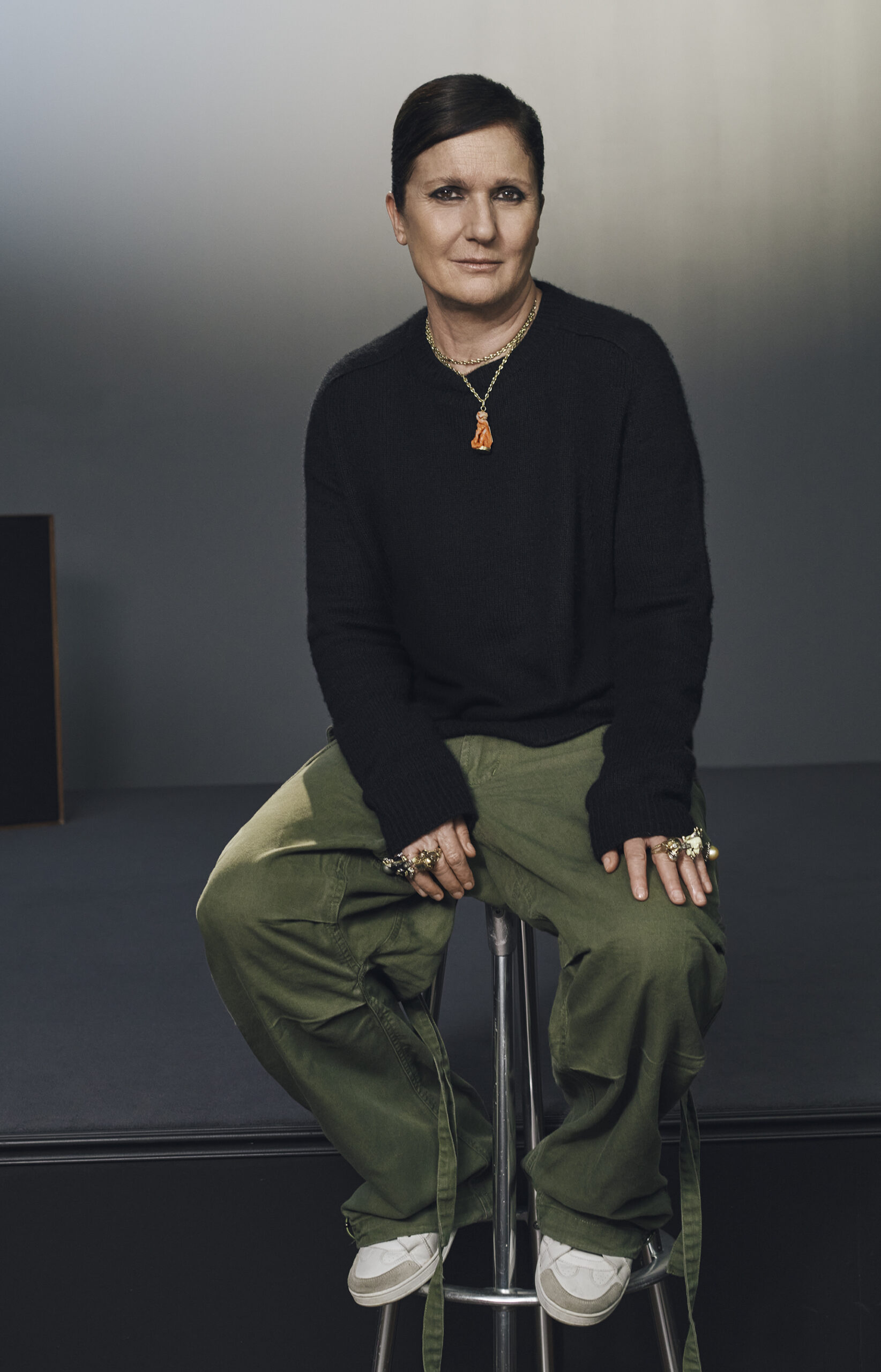
Maria Grazia Chiuri wears Shirt, Pants, and Shoes Dior. All Jewelry Maria Grazia’s Own. Photographed by Collier Schorr.
Ahead of the staging of her provocative, New York–inspired Fall 2024 collection at the Brooklyn Museum this spring, Dior’s creative director Maria Grazia Chiuri calls up her friend and muse, the Spanish pop star Rosalía, who’s got some questions about the Italian designer’s personal life and public practice. With some translation help from Chiuri’s daughter Rachele Regini, the duo reminisces on childhood fashion memories, famiglia, and creation as a form of meditation.
———
MONDAY 5:30 PM MARCH 4, 2024 PARIS
ROSALÍA: Hello!
MARIA GRAZIA CHIURI: Hello Rosalía. How are you?
ROSALÍA: I’m good, y tú? Como estás?
CHIURI: Bene. Where are you now?
ROSALÍA: Barcelona.
CHIURI: Ah, more relaxed, huh?
ROSALÍA: Si. Con mi familia. Muy tranquila.
CHIURI: Me too. Tomorrow I’m going back to Roma, con la mia famiglia—my husband, my son, my mother. Work is so intense that it is important to come back to normal life. Very important. [Laughs]
ROSALÍA: One hundred percent. Maria Grazia, I prepared so many questions for you, so let me know when you’re tired of me, okay?
CHIURI: Don’t worry, I’m never too tired to speak with you.
ROSALÍA: Allora. Com’eri da piccolo e com’eri da adolescente?
CHIURI: Credo—in italiano o in inglese?
RACHELE REGINI: In English.
CHIURI: Ah, in English. I was really boyish. I spent all my time in the garden on top of the tree. I was not a pretty girl. My mother used to dress me like a pretty girl, but I didn’t always like it. I preferred denim pants, playing football.
ROSALÍA: Actually, I’m similar to you with that.
CHIURI: Because I grew up in the countryside with nature, I was a little bit wild. I never got my hair cut. I never used makeup when I was child.
ROSALÍA: You didn’t like it.
CHIURI: No, I wasn’t interested in it. I was comfortable wearing pants, sneakers.
ROSALÍA: That makes me think about something. As a designer, are you more interested in functionality or in art, or in making both work at the same time?
CHIURI: I really love art. When I was young I studied art history. At the same time, I grew up with my mother who was a seamstress. Growing up, I spent a lot of time sewing. Me and my friends would create dresses for my birthday parties. It was playful and very free. In my time, there was no internet, no social media, so everything was much more spontaneous, and without the pressures that there are now.
ROSALÍA: So you were introduced to fashion through your family?
CHIURI: Yeah, but at the same time, it was a way to express myself. I sketched from the beginning, but I was more into comics and superheroes. It was only when I was around 19, 20, I decided, “I can do work in fashion.” Also, in my house there were always magazines like Vogue. But fashion was not for everybody. It was only a small part of society that dressed up. And around me, people dressed normally. Fashion was more for special occasions like weddings, birthdays. Now it’s so different. We didn’t have all the stores that we have today with all the brands. But I remember when I bought my first fashion thing, it was a pair of patchwork denim pants from this small store in Roma that was super cool at the time. And I remember how much I discussed it with my family because they wouldn’t give me money to buy clothes. It was an obsession for me.
ROSALÍA: What is one of your happiest memories or which one do you revisit most?
CHIURI: I remember when I started to go to the flea market, because at the time it was not so usual to go. I found an American military jacket and customized it with embroidery at home with my friend. We loved customizing things, like bags. We had this idea that it made the clothes more personal, and that is also very present in my work today because I want everything to feel special for the people that wear it. I was proud to wear my customized clothes. It felt cool that it was not expensive, that there was no brand.
ROSALÍA: You made it yours. There’s something so powerful about that. This makes me think about how I can channel my wishes and moods through styling. For example, I have this silly t-shirt from Hysteric Glamour that I put on when I wish I was funnier, or I wish I was more bold. Some kind of fake-it-till-you make-it thing. But actually, there’s so much power in using matter to create reality. How would you describe your relationship with craftsmanship and matter?
CHIURI: Yes. For me, clothes have a personal memory. I remember when I used to wear old dresses from my mother or my grandmother, I’d style them differently and try to make them shorter, and they would look at me and say, “Maria Grazia, what are you doing?” But for me it was cool. When I see the way Rachele wears those dresses now, I find it very fun because in some way I see myself in her. She wants to change it, she wants to make it even shorter than I did. There is a memory in those clothes, but it’s more than a souvenir, it’s something that connects you with your past and present.
ROSALÍA: And there’s so much value in it.
CHIURI: Yeah. I don’t remember many things, but I remember all my mother’s outfits, her at the front door with a long kilt. I remember the look of my father too, because he used to wear sandals like a monaco.
REGINI: Monk.
CHIURI: Which were not so normal at the time. [Laughs]
ROSALÍA: So would you say that, as an artist, your ultimate desire is to create pieces that are going to be memories?
CHIURI: Yes. I think that’s the goal for all designers, to create something that people feel is part of their personal wardrobe, part of their personal life. It’s a bit ambitious, but I think every designer wants to create something that is timeless. It’s the same as music. You want people to be able to link a special moment to a song.
ROSALÍA: I find what you’re saying so beautiful, and I think that for me, if I can make songs that can accompagna—
CHIURI: Si, accompagna la vita.
ROSALÍA: I feel very blessed and grateful.
CHIURI: I have a poncho that I bought, I don’t know how many years ago, in Formentera, and everywhere I go I bring it. Nobody can touch this poncho [Laughs]. When I travel, I know that the first thing that I put in my luggage is that poncho. I feel confident to have it.
ROSALÍA: It’s so human to get attached to material things, to put love into objects.
CHIURI: It’s a connection. When my son, Niccolò, was a baby, I couldn’t change my pullover because he was so obsessed with it. He felt my smell. If I left him, I left him with this piece of knitwear, because it was like a memory of me when I was not present. It was super cute.
ROSALÍA: Is there something you are obsessed with or that you collect?
CHIURI: I’m really obsessed with books. That’s another thing that I find very personal, because I write the things that I want to remember on them, the things that touched me a lot. My first love is probably accessories, especially bags. I love designing bags, too. There are some that I never use that I just like to have. Rachele is obsessed with shoes. I am obsessed with bags.
ROSALÍA: I love shoes, too.
CHIURI: Most women do. Also, bags are part of my memory, probably because they were the first objects that I started to customize. And also because in my generation—do you remember the Tolfa bag? It was a leather bag that you could customize. My generation is ’78, so it was a little bit hippie. That was our reference in fashion at the time. We were also really into this Indian scarf.
ROSALÍA: Yes. I wish I had experienced that time. It was such a strong moment that I’ve always been curious about.
CHIURI: Yes, it was a very important moment. It was more free, less formal, and also more spiritual too. Yoga was popular—at the time everyone’s dream was to go to India. Nobody could afford it but our dream was to travel around the world. But it was really about freedom. My generation was the generation of disco music. Donna Summer. We were obsessed.
ROSALÍA: You mentioned spirituality. Is there a spiritual component to your work?
CHIURI: Some work is like meditation. I work a lot with India for embroidery and there is the school that we support, a women’s school of embroidery [Chanakya School of Craft], because in India, embroidery was only done by men before. But embroidery is like meditation, because you have to be so concentrated and you have to be very passionate to make it work. Even draping is like meditation. There’s something technical but also something very spiritual about it, because you have to be so concentrated. On the other hand, I think like a designer when I work. You have to ask yourself questions, especially at a time when fashion tackles so many different problems. You have to really think about what you are doing, if you are convinced by it, and whether it reflects your values and what you want to say with your work.
ROSALÍA: Being conscious and connected with what’s happening.
CHIURI: Connected, yes. You have to feel that very strongly.
ROSALÍA: Yeah. And you’re a woman who fights for your vision, I can tell. This is something I admire about you. It was a privilege to see how you work in Paris. You’re such a strong woman and so commanding. I’m wondering if you have any advice on how to be a good leader?
CHIURI: It’s very important to have a strong passion, but at the same time you have to be conscious that you are managing a lot of people. So sometimes that is very stressful, but it’s important that you take time off when you can. Because especially in this time where we are moving so fast, you don’t have time to reflect. But you can always stop for five minutes and come back. You don’t lose anything.
ROSALÍA: Don’t be afraid to rest.
CHIURI: Absolutely. Especially for women, it’s important that we’re not worried about making mistakes because it’s normal. You can learn more from a mistake than from a moment of success. You can always restart. There’s too much pressure on the new generation. It’s like, “You are not a doctor. You won’t kill anyone if you mess up.”
ROSALÍA: [Laughs] You seemed so confident when you came out after the show in Paris. By the way, congratulations.
CHIURI: Thank you. That’s the part of my job I don’t like, to stand onstage. I like creating the collection with my team. I don’t think the performance is part of my job.
ROSALÍA: I understand, there’s a very performative element in it that maybe you don’t feel—
CHIURI: This time I went on the wrong side, I made a mistake because I was not concentrating. I was thinking about something else. But what I find very exciting is when you start something new, showing it’s okay, it’s beautiful, but it’s not the creative moment. The creative moment is done before when you prepare the collection, when you choose the material, when you see the color, when you create a new shape, that’s the creative moment. After you show your work it’s different. That’s when I like other people to take over so I can relax and I start a new project. That’s what I like.
ROSALÍA: For me, when I’m in the studio is when I’m creating songs. But then when I’m performing them and when I’m presenting them, I’m able to create in that moment, too. Because you can always remake the song differently.
CHIURI: You are doing another job because you sing. But when there is a show, I’m not doing anything.
ROSALÍA: [Laughs]
CHIURI: I watch the show on a screen and that’s it. [Laughs] So there is not this connection because everything is done before.
ROSALÍA: Pero Maria Grazia, you have such a good sense of humor. Literally since I met you. How does being Roman make you the artist that you are?
CHIURI: Roma is a strange city that has a big history. There is this aspect between sacrality but also profanità?
REGINI: Profanity.
CHIURI: So I grew up in a context where this is very intense. But I think that we have a lot of connection also in Spain, it is the same in many different cities. You feel this very strongly. It’s a characteristic that is very specific to the Mediterranean.
ROSALÍA: It’s true. Una pregunta, if they tell you have to choose one last meal before you—
CHIURI: One last meal?
ROSALÍA: You can choose anything you want. What would it be?
CHIURI: Pasta pomodoro. I love pasta pomodoro. I cook it all the time.
ROSALÍA: Not Amatriciana?
CHIURI: No, no, too complicated. I prefer pasta pomodoro. I love tomato. I am obsessed with tomato. I eat it with everything.
ROSALÍA: I need the recipe. [Laughs]
CHIURI: Now when you come back, I will cook it for you at home.
ROSALÍA: Soy tu ayudante.
CHIURI: You can’t imagine how much we cooked this week. All fashion week I cook at home for my friends every day.
ROSALÍA: That’s so sweet.
CHIURI: Yes, because we love to eat a lot.
ROSALÍA: Maria Grazia, perdón si te hago tantas preguntas.
CHIURI: No, don’t worry. It’s fun to speak with you.
ROSALÍA: Maria Grazia, thank you. Grazie, grazie, grazie.
CHIURI: Grazie a ti. Thank you. A presto.
———
Hair: Chiao Chenet at LGA Management.
Makeup: Rebecca Wordingham at Bryant Artists.
Nails: Romane Martini using Manucurist at The Wall Group.
Models: Elip at GIRL, Isabela Correia at Select Model Management, and Krini at Elite Paris.
Casting: Anita Bitton at Establishment New York.
Photography Assistant: Valentine Lacour.
Fashion Assistant: Johanna Vikblom.
Makeup Assistant: Sarah Carlier.

